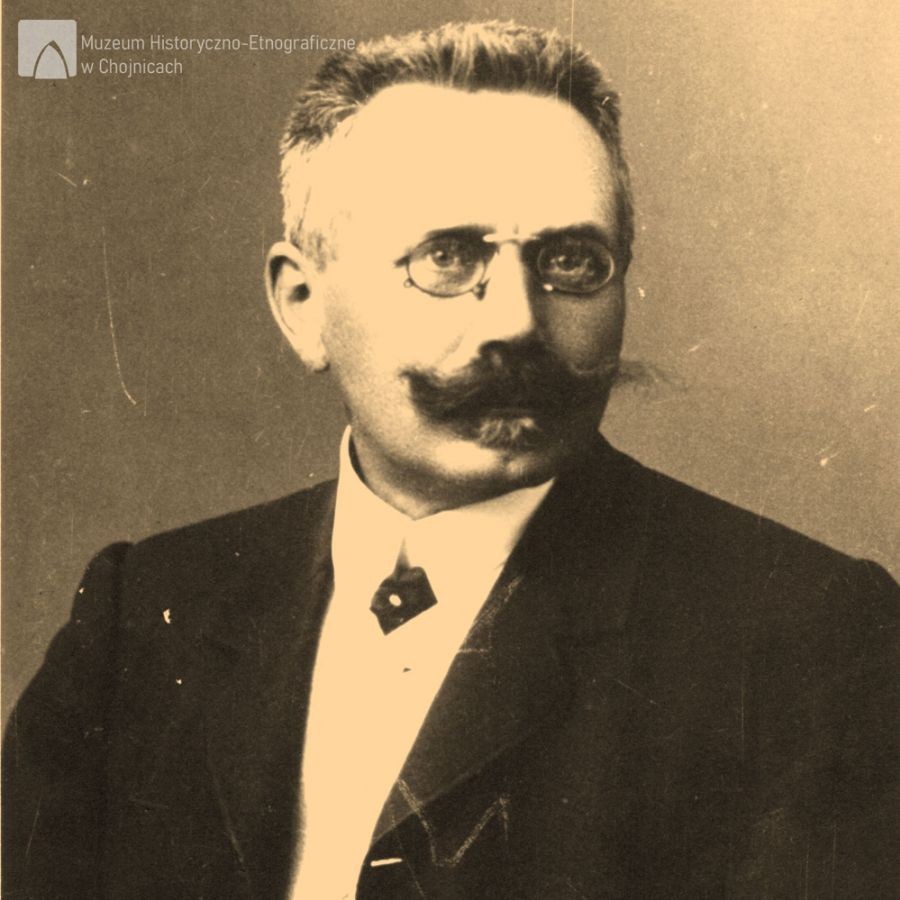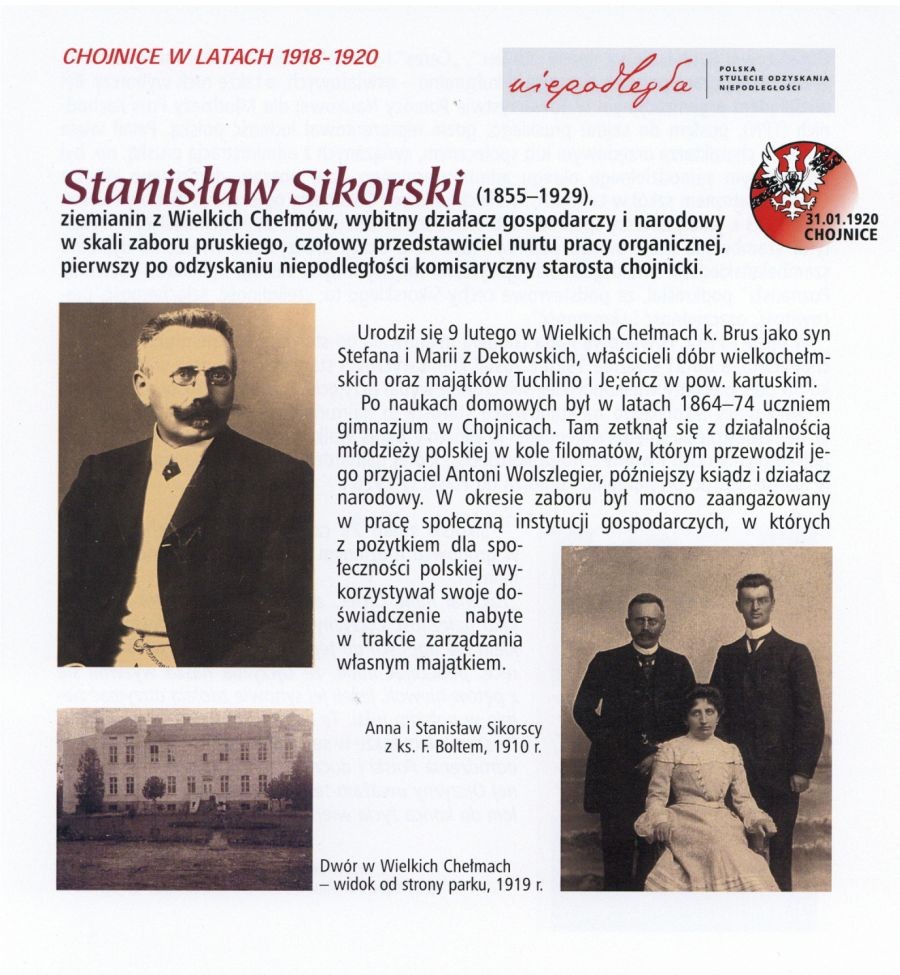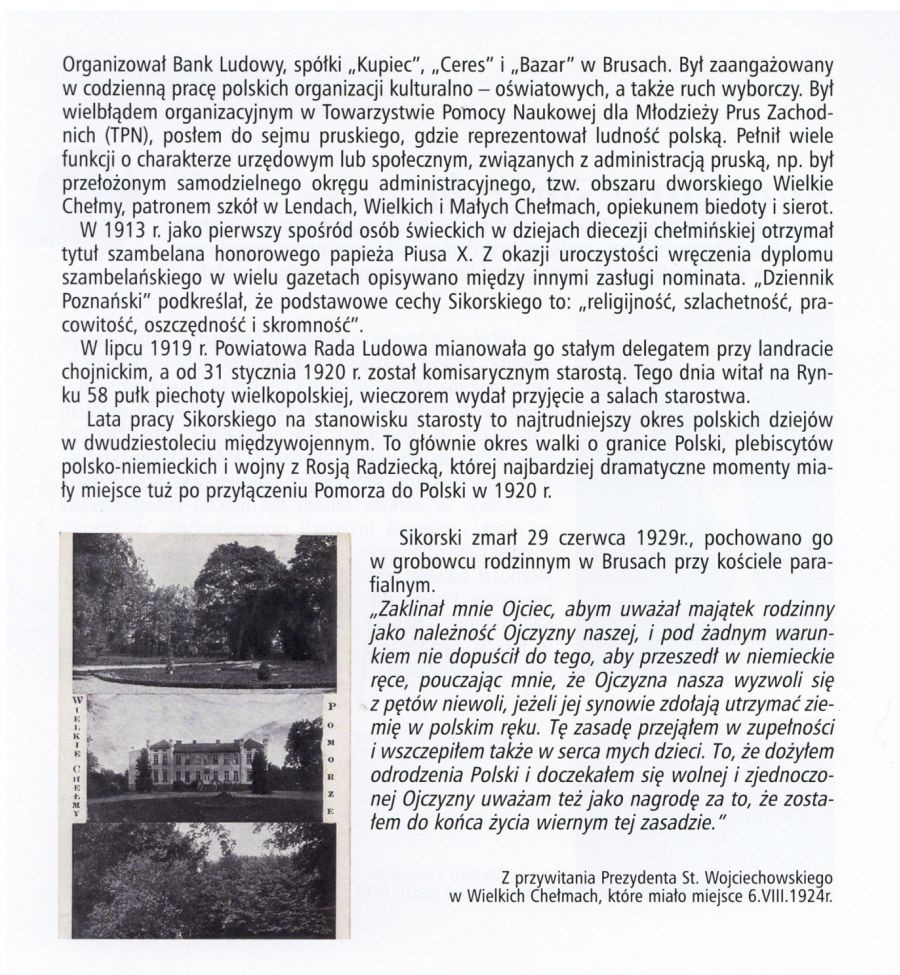
Stanisław Sikorski (1855-1929), ziemianin, wybitny działacz gospodarczy i narodowy, czołowy przedstawiciel nurtu pracy organicznej, szambelan papieski, pierwszy polski starosta chojnicki po odzyskaniu niepodległości
The Sikorskis of the Cietrzew coat of arms were related to many noble and landed gentry families in Pomerania. Stanisław was born on 9th February 1855 on the family estate in Wielkie Chełmy near Brus, the son of Stefan and Maria (née Dekowska), owners of the Wielkie Chełmno estate, which consisted of a number of noble families. Dekowska, owners of the estate of Wielkie Chełmy, which consisted of several manors, and the estates of Tuchlino and Jeleńcz in the Kartuski district.
From 1864 to 1874, he was a pupil of the grammar school in Chojnice, and then at German universities he studied polytechnics, which he completed in Berlin with an engineering exam, specialising in bridge-building. In 1881, due to the death of his brother Bolesław, he was called upon to take over the family estate. In the spring of 1883, after serving an agricultural apprenticeship, he took over the administration of the estate of Wielkie Chelmy, and a few years later became its owner as a result of family divisions. In 1888 he married Anna Łyskowska, daughter of Ignacy from Mileszew near Brodnica, a well-known promoter of positivist work also outside Pomerania.
Stanisław Sikorski introduced modern farming methods on his estate. He was a forerunner of technical progress in agriculture. Thanks to the income and profits from the sale of timber, he was able to buy more landed estates. In 1896, he managed to buy back his wife's family estate of Mileszewo, competing with the Colonisation Commission. In time, Stanislaw Sikorski became the wealthiest landowner in Kashubia, and on a provincial scale he entered the group of 15 richest Poles. Between 1918 and 1920, he purchased several estates from Germans leaving Poland.
During the Prussian partition he became actively involved in social economic institutions. In 1883, he was elected president of the Supervisory Board of the People's Bank in Brusy. Together with the priest Feliks Bolt, in 1898 he organised the ‘Kupiec’ company (its branches were established in Śliwice, Wielu, Zblewo and Stara Kiszewa), as a counterbalance to Jewish and German merchants. In 1904. Sikorski, together with Bolt, founded another joint-stock company ‘Bazar’ in Brusy, whose branches were established in subsequent years in Skarszewy, Kartuzy, Bytów, Pelplin, Starogard and Kościerzyna. Their activities contributed significantly to the emergence of a petit bourgeois layer in Pomerania, as well as to the development of a strong economic centre in Brusy.
Stanisław Sikorski and his wife Anna were among the leading organisers of social and political life. In 1900, in the established Landowners' Union, he held the position of shop steward for the Kashuby region. He was a member of many associations such as: Scientific Society in Toruń, Board of Trustees of the Society of Friends of Kashuby in Sopot, Society of Scientific Aid for Youth of West Prussia. He founded the Polish Catholic People's Society in Brusy, and was also a shareholder in the publishing company ‘Pielgrzym’ in Pelplin.
As a result of his achievements, he was elected in 1908 as a member of the Prussian Parliament from the Lubavian district, and in 1913 he joined the National Council in Poznań, the highest representation of Poles in the German Reich. He worked closely with Father Franciszek Drapiewski, pastor of the first reactivated parish in Swornegacie. For his services to the Church in 1913. Sikorski received the title of honorary chamberlain of Pope Pius X. He became a member of the District People's Council in Chornegacie, established on 11 December 1918. District People's Council in Chojnice. As an activist of this representation of the Polish population, he was appointed on 3 July 1919 as a delegate to the Chojnice Landratura during the preparations for the assumption of power in the district. On 30 January 1920, he was appointed commissar starosta of the Chojnice district. The following day, on 31 January, at the Chojnice Market Square, together with Mayor Alojzy Sobierajczyk, he welcomed the Polish Army taking over the town and district on behalf of the Republic. In recognition of his services to his homeland, he was awarded the Polonia Restituta Order in 1922. After more than three years of official service, he was relieved of his post as starost on 31 March 1923. He and his wife Anna continued to be active in many social organisations and charity actions. The Sikorski House in Wielkie Chełmy was a lively centre of cultural life, visited by such prominent personalities as General Józef Haller, National Democracy leader Roman Dmowski and even President Stanisław Wojciechowski.
Stanisław Sikorski died on 29 June 1929 and was buried in his family tomb at the parish church in Brusy. He belonged to the outstanding generation of the Polish intelligentsia, who were not afraid to put up strong resistance to the process of Germanisation. As an educated representative of the landed gentry, he shaped the social identity of Poles through his political and economic activities. He was an advocate of organic work, which he tried to implement in the Kashubian countryside. The figure of Stanisław Sikorski, the first Polish starost and an outstanding independence activist, was commemorated in the form of a plaque in the hall of the Chojnice District Starosty.
More information about Stanisław Sikorski can be obtained from the following publications: ,,Pamięci godni. Chojnicki słownik biograficzny 1275 - 1980’ by Zbigniew Stromski from 1986 and ’Poczet zasłużonych Chojniczan. A biographical dictionary of the 20th century’ by Kazimierz Ostrowski from 2020.

